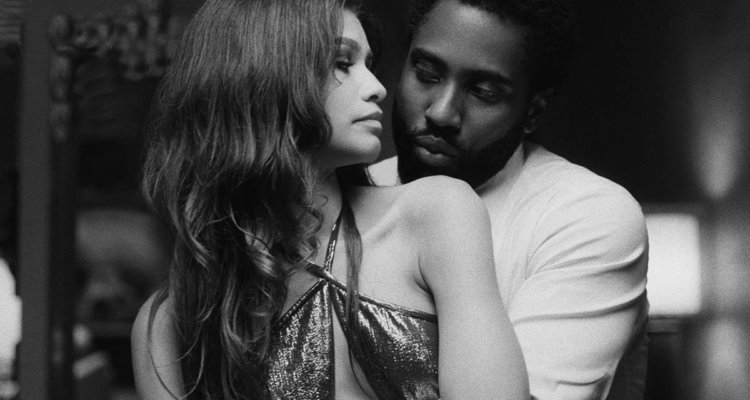“No one fucking cares about that sh*t, Malcolm!” shouts an exasperated Marie (Zendaya). Malcolm (John David Washington) worships the classic filmmakers—a love externalized by way of the vintage title credits that open the film—espousing the genius of William Wyler and the brilliance of “The Best Years of Our Lives” and “Citizen Kane.” Within the confines of this luxe modernist home, nestled in the Hollywood hills, the ensuing quarrel between the couple is unlike any other. Yet, if we’re to study them as incompatible people, we should know it probably is like any other. Their ten-round bout masquerading as raging intellectualism reveals their shortcomings and insecurities; however, they never reveal themselves.
READ MORE: The 100 Most Anticipated Films Of 2021
Sam Levinson’s “Malcolm & Marie” is a purposely self-absorbed meta-narrative about a navel-gazing director at odds with his muse—an enticing premise on paper—that too often obscures its heart in lieu of tedious diatribes.
READ MORE: The 25 Best Films Of 2020 You Didn’t See
Levinson, early on, makes clear where his interests lie. With the groundbreaking series “Euphoria,” Zendaya and Levinson have formed a formidable tandem, a tight-knit bond that translates to “Malcolm and Marie.” In the opening salvo, the couple return from Malcolm’s latest successful film premiere, finds the celebratory Malcolm strutting through the glass-paned home as James Brown’s “Down and Out in New York City” soundtracks his jubilee. Washington is often stiffer than he should be in his performances, evident in “Tenet” and “BlacKkKlansman,” but here, to open the film, he’s never been looser. Cinematographer Marcell Rév, who offers slick black and white photography, utilizes a dynamic tracking shot to follow Washington’s one-man party. Their lens, as Marie stands in the doorway smoking a cigarette, is detached from Malcolm. They’re consumed by the same intoxicating allure felt by Malcolm for Marie.
Levinson’s picture, initially, balances anti-industry harangues and sharp storytelling. Take Malcolm calling out white critics from esteemed publications who map socio-political interpretations on Black filmmaking to cover for their inability to decipher Black art. Malcolm rages against an unnamed white critic who compares him to Spike Lee and Barry Jenkins, but not a white filmmaker. In her best deadpan delivery, Marie comically calls Malcolm out for his feigning populism (he’s a college-educated guy from money). She is detached from him, and over the course of Malcolm’s truthful railings against white film critics, it’s revealed that her disappointment stems from him not appreciating her in his “thank you” speech.
READ MORE: The 25 Best Films Of 2021 We’ve Already Seen
When “Malcolm & Marie” is rolling, Levinson uses these rants to reveal new layers in this couple’s relationship. Marie is a former actress and recovering drug addict-turned-model. Malcolm is the much older director who found Marie, nursed her back to health, only to mine her personal life for “authentic” (a word used by critics that meets Malcolm’s ire) stories for his films. Levinson does approach the much-debated age gap between these characters. The narrative mechanics he uses to explain it, however, its inherent power imbalance, feels frustratingly unexplored. Rather, Levinson sticks to extrapolating the relationship between creator and muse. Where does inspiration start and plagiarism end? Where does love flourish, and what does gaslighting extinguish?
READ MORE: The 25 Best Films Of 2020
Their back and forth, whereby Marie and Malcolm trade the upper hand, quickly loses steam. By the halfway point, we know everything about these characters. And what we don’t know, dances out of reach. The narrow focus is partially by design. As with any other fight, each party offers their side of the argument, only to fizzle and repeat the same talking points again. That natural ebb and flow feels “authentic,” but also less cinematic. Rather Malcolm and Marie’s confrontations soon become tedious, as they rarely advance the story, and often burrow further into inside-cinematic-baseball.
Malcolm spends interminable stretches complaining about how art, creatives, and critics are judged. He’ll drop references to “Spirit of St Louis,” Ed Wood, Elaine May, and Ida Lupino with a wink-wink. Nod nod. His navel-gazing, to a point, is by design. It speaks to his self-absorption, imposter syndrome, and his shame and guilt for lacking the ability to create visceral stories from his own experiences only to gaslight Marie for providing her traumatic past. Marie proclaims to Malcolm that nobody cares. Indifference to two affluent people’s problems guides this myopic narrative, but it shouldn’t make us dispassionate about their welfare. And amid the diatribes against franchises and the male gaze, Levinson lost me.
The actors get lost too. The loudest performance is often, mistakenly, regarded as the best. While Zendaya continues her fantastic run, and Washington swings for the fences, the pair punch up their arguments to the point of decimating their emotional headroom. And each time they hit their limit, their limit lessens, offering diminishing returns on their next attempt. Zendaya is furious; she is magnetic, yet she slips into the loud. Washington misses, too. He confuses shouting with emotional depth. Washington is reaching, and the reach, from his tears to his expletive-laden outbursts, is evident. Zendaya inhabits her character. Washington performs his.
But Levinson, committing the gravest mistake, shifts “Malcolm & Marie” from a character-driven romance to a thought experiment. He gleefully skips into the rabbit hole of Malcolm’s shallow, narcissistic artistic soul, often leaving Marie to giggle in delight. And while Marie gets in her verbal punches, her life from the point of her drug recovery to knowing Malcolm now, is parsed with less enthusiasm. Intermediately, as a critic describes Malcolm’s work, Levinson is brilliant and fearless. The cinematography, R&B-infused soundtrack, and the salient points regarding how Black art is consumed and judged hit home. But his picture is also a bleak and repetitive 100-minute black and white film school homework assignment. A film made for cinephiles and industry folks, but maybe not for your next date night. [C-]
“Malcolm & Marie” arrives on Netflix on February 5.

